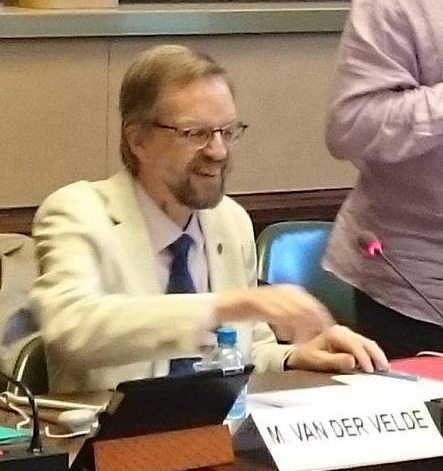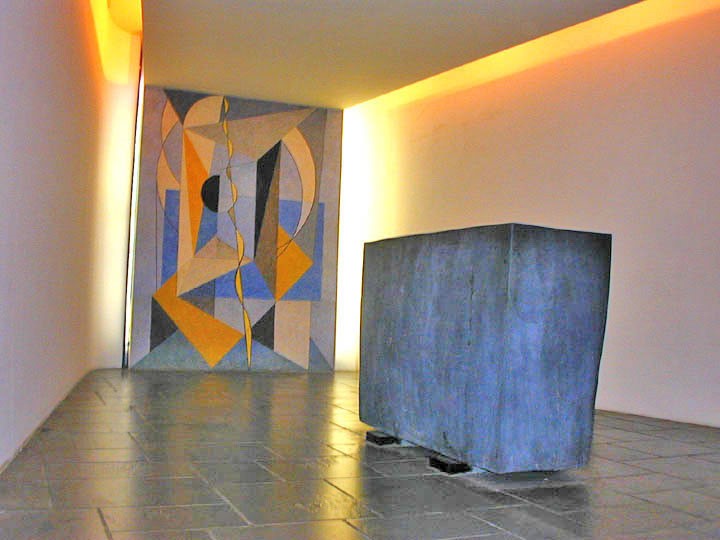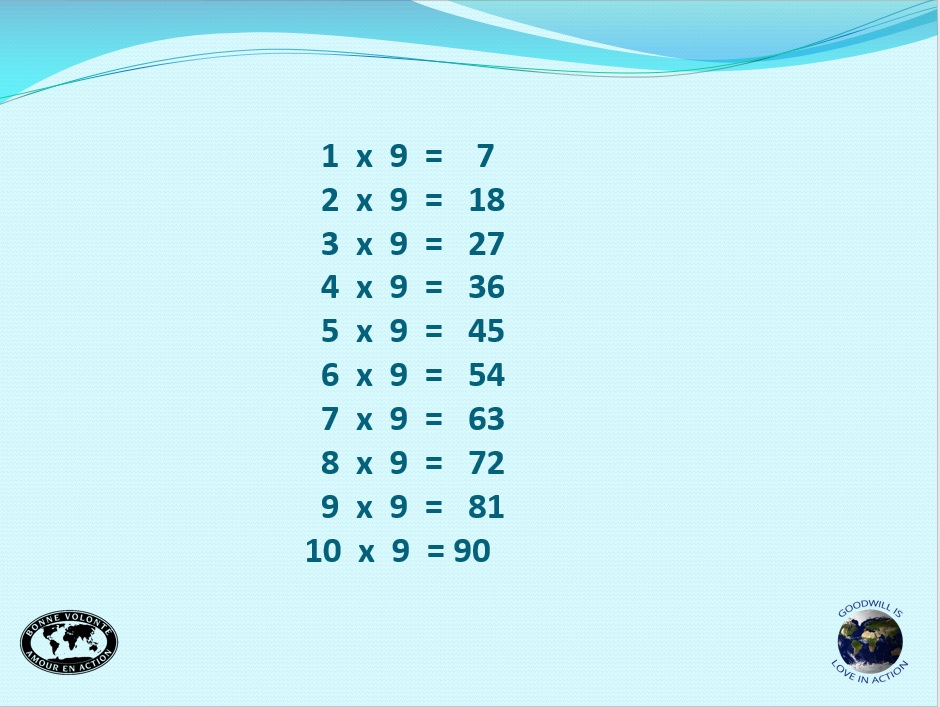Good Will, Ethical Responsibility & the Sustainable Development Goals: the Challenge of this Century
Mintze van der Velde, World Goodwill, Geneva
from the opening address to World Goodwill Seminar, UN Headquarters, Geneva. 28, October 2016

Let us begin with silence: Silence is not unusual in the walls of the United Nations
In the Preamble to the UNESCO Constitution we can read: “Since wars begin in the minds of men and women, it is in the minds of men and women that the defences of peace must be constructed.” In other words, and broadening that idea a little bit, if ever the SDGs are going to materialise, they have to be first addressed in our minds. World Good Will, through the energy of good will and the establishing of right human relations, tries to contribute its part to that process. And we hope that the discussions of this afternoon may contribute its tiny part thereto too.
In the clamour and noise of the world of today, connected by social networks functioning at the speed of light and producing political discussions of a type never seen before, there might be a quality or subject of interest also to our discussions of today – and that is: silence. For ideas to emerge, for thought forms to have a chance to come to our minds, silence is a prerequisite.
The United Nations HQ in New York has a so called Meditation Room dedicated to silence in the outward sense and stillness in the inner sense. The New York silent room was initiated by the second Secretary-General Dag Hammerskjöld, who said of this room: “We want to bring back, in this room the stillness which we have lost in our streets, and in our conference rooms, and to bring it back in a setting in which no noise would impinge on our imagination.” Secretary-General Ban Ki-moon, who will leave office at the end of this year, began his first day in office in 2007 by visiting this Meditation Room. Here in Geneva such a room is as yet absent but for the coming project of the renovation of the Geneva United Nations compound a request has been launched to include such a silent room at Geneva HQ too.

Annual sessions of the General Assembly in New York begin with the President inviting representatives to observe one minute of silence dedicated to prayer or meditation. Thus silence is not such an unusual thing within the walls of the United Nations. May we therefore invite you to observe one minute of silence, in which you may meditate, pray or just be simply silent. You may remain seated. So let us have one minute of silence.
Goodwill as a Most Basic Spiritual Quality
As some of you may know my background is in mathematics and theoretical physics, so when I show you the following table:

most of you will say: “Oh boy, you don’t need a PhD to see that in the first line you made a mistake.” And yes, you are right. But what you failed to do is to congratulate me with the fact that I had nine out of ten lines right! This is typically human. We tend to focus on things that don’t work, rather than on the good things that do work. We do this in our society as human beings or in our family, but quite often we also do this to ourselves as individuals. Often the facts don’t change but the way we look at these facts, the way we interpret them makes all of a difference.
Goodwill is one of the most basic spiritual qualities of the human being and the great untapped resource at the heart of every human community. This energy is potentially a powerful force for social change – yet its power remains largely unrecognized and underutilized. World Goodwill fosters understanding of this energy and the role it is playing in the development of a new humanity.
It is the thoughtful, planned action of networks of goodwill that is driving the response to all the problems of our age: from poverty, poisoned race relations, migration and refugees and environmental destruction through to sentimental spirituality, despair in thinking about the future, and the crises of materialism and selfishness. People of goodwill from all cultures, faiths and professions are creating, through their words and actions, a new world where sharing, cooperation and right relations are taking root and spreading. Never before in the history of the planet has goodwill been so active.
The diversity and variety of initiatives means that the people of goodwill can never be organized into one unitary movement or network. Every community has its people of goodwill. It is goodness and love, in their most basic human expressions, that are driving the momentum of change, challenging all of the habits of separative thinking and action. Recognition of the sheer abundance of goodwill action as it exists today and the countless movements drawing on the energy of goodwill changes the way we see what is happening in the world. It is empowering and it gives us grounds upon which hope and faith in the future can grow. Truly, goodwill has the potential to become the keynote of a new civilization of wholeness.
To bring in the new day and the human well-being which is our birth-right, we need a deeper sense of reality based on spiritual values, and a new perception of humanity as a unit of divine life within an ordered and purposive universe. It is difficult for modern man to conceive of a time when there will be no racial, national or separative religious consciousness present in human thinking. It was equally difficult for prehistoric man to conceive of a time when there would be national thinking and this is a good thing for us to bear in mind. The time when humanity will be able to think in universal terms still lies far ahead but the fact that we can speak of it, desire it and plan for it is surely the guarantee that it is not impossible. Humanity has always progressed from stage to stage of enlightenment and from glory to glory. We are today on our way to a far better civilisation than the world has ever known and towards conditions which will ensure a much happier humanity and which will see the end of national differences, of class distinctions (whether based on ancestry or financial status) and which will ensure a fuller and richer life for everyone.
The Historical Context of the SDGs
To set the stage for this afternoons talks and discussions, let me briefly outline the historical context of how we came to the Sustainable Development Goals (SDGs) and why they are the challenge of this century. That will at the same time make clear why good will and ethical responsibilities play a pivotal role in the whole process.
The problem of sustainable development, seen from both a socioeconomic and an environmental perspective, has been triggered by the extraordinary growth of the human species (5 million people 10,000 years ago when agriculture began to 7.4 billion today, increasing to approximately 11.2 billion by the end of this century) and the simultaneous increase (by over 100 times) of the resources used by each person.
The first major signal of concern was given by the 1972 Report of the Club of Rome or Meadows report: “The Limits to Growth.”1 It caused a great sensation because of its clear message: In a basically closed system like the Earth it is impossible for the population, food production, industrialization, the exploitation of natural resources and pollution of the environment to continue to experience exponential growth without sooner or later collapsing. (The report forecast this to occur around the second half of this century.) The report concluded that to prevent this disaster, a collective commitment would be needed to curb the indiscriminate growth of the economy and achieve global equilibrium. The report was welcomed by environmentalist, but crushed by politicians and the business world. Nevertheless a 2011 study along the same lines shows that we are on the curve of “business as usual.” While the report set certain limits, it did not provide policies or strategies to obtain these limits. Further confirmation of the imminent consequences of exponential growth can be found in the 2012 Nature paper by Elizabeth Hadly and Anthony Barnosky2. This paper confirmed the basic conclusions of the above mentioned Meadows Report and lead several policy makers to wake up.
In the development of policies to limit indiscriminate growth the concept of sustainable development goals was well defined in 1987 in the final report of the United Nations Commission on Environment and Development led by Gro Harlem Brundtland called Our Common Future3. It affirmed that “humanity has the possibility of making development sustainable, that is of ensuring that it meets the needs of the present without compromising the ability of future generations to meet their needs. The concept of sustainable development involves limits, but not absolute ones, since they are imposed on economic resources by the present state of technology and social organization and by the capacity of the biosphere to absorb the effects of human activities. Technology and social organization can, however, be managed and improved to usher in a new era of economic growth.”
In a 2015 briefing for NGO’s at the UN in Geneva the Special Advisor of the Secretary General, Dr. David Nabarro, emphasised that implementation of this agenda concerns everyone: governments, businesses, academics, but also you and me. We are here talking about “global citizenship” as well as “global accountability” and please note: there is no plan B. The SDGs are not an empty set of propositions to keep a club of diplomats busy. Dr. Nabarro also conceded that the ethical aspects of each of the seventeen SDGs need to be taken into account.
From a certain perspective we are talking about thought form building and invocation and evocation – in practice: one of the first objectives of the UN is that about 2 billion people will know about these SDGs (hence the logos). You will find in your language packs of this Seminar (available at the entrance of this room) postcards with the 17 Sustainable Development Goals logos in different languages.
When discussing whether economic change is possible without collapse a recent report of the Club of Rome4, notes: “So society needs to buy time. It can do this by moving towards a circular economy and by transforming the economic system gradually, by restructuring finance and business, shifting to renewable energy, reforming food production and redefining the nature of work, to generate jobs and guarantee livelihoods. The technology and understanding to make these changes already exists. It is a question of social and political will.” This brings in the will aspect, a step further than simply good will.
We all know that it is not easy to change things on earth. We are told that “Human planning today is one of the first indications of the emergence of the Will aspect.” 5 This will is not the matter of one individual: When one or two persons have a good idea, the challenge is to transfer that idea to the masses of people. Two approaches are here at work at the same time, sometimes competing, sometimes cooperating:
One is the Bottom-up approach and this is highlighted in for example the movie “Tomorrow”6, which has also been published as a book. Many, very many initiatives exist including local farming, alternative money systems, energy policies, education, initiatives to make democracies work, etc. – in all of the seventeen goals of the 2030 Agenda (i.e. the SDGs) this bottom-up approach is already at work now.
We are often discouraged and overwhelmed by thoughts like: “This will never happen,” “Yes, but you know those lobbies…,” “It is up to the politicians to fix this,” “This is far too small to really work,” “What do you want us to do?” “Anyway, it won’t change a bit.” But in that way, nobody has ever changed a thing in the world. As more and more people become aware of the real challenges of this century, more and more people will open up to the energy of good will and foster right human relations – which are key to finding the right solutions. One little project may perhaps not make a big difference, but when many, very many little projects emerge, no matter where on this planet Earth, that will make a difference.
The other is the Top-down approach. It is here that the United Nations play a crucial role. The United Nations are one of the few places where governments and civil society (for example through the many Non-Governmental Organisations) meet, talk and try to build a better world. No one and no organisation is perfect and also the UN is not perfect. Remembering the table of multiplication I started with, it is easy to criticise. And yet, the UN is at the root of the Universal Declaration of Human Rights and many subsequent resolutions and agreements, ratified and thus accepted by most countries of the world. And it is even worthwhile to keep the Charter of the United Nations in mind. In referring to ‘We the peoples of the United Nations’ the Charter is referring to the good will that is inherent in all the peoples of this planet. One of the more recent results of the Top-down approach is The Paris COP21 or United Nations conference on climate change which has been concluded and ratified by many countries in an unprecedented short time. So also governments are aware of the urgency of the issues at stake in the SDGs.
The word ethical comes from ethics, which has its root in the Greek word ethos and means the study of moral philosophy. Here questions are discussed like “What is considered good and bad?” or “What is the difference between right and wrong?” When we look at this from the point of view of the intellect, whole volumes have been written on the subject. Yet, when we lift it from the intellect to the intuition, don’t we all know what this is about? When reading the SDGs in more detail they may seem an intellectual exercise. Yet, as Dr. Nabarro acknowledged, the ethical aspects of the SDGs are also important and this gives a deeper meaning to the whole concept. It is this meaning that we will explore together this afternoon with various talks.
Change always starts as an idea. It is on that level, i.e. the world of ideas, that both ethics and good will play a crucial role. In the top-down approach governments and administrations will have to face the pressure of lobby groups trying to push decisions to a direction not necessarily in the common interest. This will require that those involved will listen to their hearts rather than their heads. Thus global change will emerge. In the bottom-up approach anyone who listens to his heart can’t help - but establish change on the local level, in his immediate environment (if not first in him or herself). When both the bottom-up and the top-down approaches work together rather than engage in conflict, the SDGs are not a fiction, but will be a real part of not only our lives but also of generations to come. If we go beyond our limitations and cleavages and define spirituality as “anything that brings humanity a step forward” then this whole discussion is of a deep spiritual nature.
Marco Toscano-Rivalta will address the role of ethics in international cooperation, as exemplified by Dag Hammarskjöld, Secretary-General of the UN from 1953 till his death in 1961, Vita de Waal will take a closer look at the relationship between the SDGs and human values. Patrice Brasseur will shed his light on this from the point of view of consciousness and explore how the different levels of consciousness in mankind and in ourselves can help us understand what is happening in the world of today. A similar approach will be developed, but more in the context of the United Nations, by Judith Hegedus. We have, quite purposively, no talked much about education, which is a very important if not crucial part of the SDGs, - because we will address that topic tomorrow in the second part of this Seminar.
1. The Limits to Growth, 1972, Donella H. Meadows, Dennis L. Meadows, Jorgen Randers William W. Behrens III, Universe Books, ISBN 0-87663-165-0.
2. Approaching a State Shift in Earth’s Biosphere, Nature 486, June 2012, p52-58, E. Hadly, A. Barnosky.
3. Our Common Future, 1978, Gro Harlem Brundtland, http://www.un-documents.net/our-common-future.pdf.
4. Is Systemic Economic Change Possible without Collapse? http://www.clubofrome.org/project/systemic_economic_change_without_collapse/
5. Discipleship in the New Age, 1955, Alice A. Bailey, Lucis Press, NY.
6. Demain – Un Nouveau Monde en Marche, 2105, Cyril Dion, Actes Sud, ISBN 978-2-330-05585-1. See also: http://www.demain-lefilm.com.